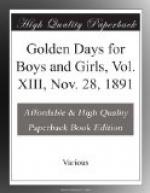CAPTAIN CHAP.—The total population of the earth is estimated at 1,480,000,000—of which Europe has 357,000,000; Asia, 826,000,000; Africa, 164,000,000; America, 122,000,000; Australia, 3,500,000; the Oceanic Islands, 7,500,000. The density of population is greatest in Europe—Belgium standing at the head, followed by the Netherlands, Great Britain and Ireland, Italy, Japan, the German Empire, China, British India, Switzerland, France, Austria, Denmark, Portugal, Spain, West Indies and the United States. More than one-fourth of the human race is found in China and Japan, the former counting 350,000,000 and the latter 40,000,000; more than one-fifth is in India, 324,000,000, of which 286,000,000 belong to British India. The only one of the chief European States that exceeds this country in population is Russia, with 93,000,000. The others range thus: German Empire, 49,000,000: Austria-Hungary, 41,000,000; France, 38,000,000; Great Britain and Ireland, 38,000,000; Italy, 30,000,000; and Spain, 17,000,000.
LELIA and PHILIP.—1. A high-class eight-wheel passenger locomotive engine costs about $8500. 2. The strength of a steam engine is commonly marked by its horse-power. By one horse-power is meant a force strong enough to raise up 33,000 pounds one foot high in a minute. James Watt, the noted mechanician, engineer and scientist, famous as the improver, and almost the inventor of the steam engine, established the horse-power unit, and the figures were fixed in the following curious manner: He found that the average horse of his district could raise 22,000 pounds one foot a minute, and that this was the actual horse-power. At that time, however, Watt was employed in the manufacture of engines, and customers were so hard to find that it was necessary to offer extra inducements. So, as a method of encouraging them, he offered to sell engines reckoning 33,000 foot-pounds to a horse-power. Thus he was the means of giving a false unit to one of the most important measurements in the world, as, in reality, there are no horses to be found that can keep at work raising 33,000 pounds one foot a minute.
INEZ and C.A.S.H.—Miles Standish was a Puritan soldier, who came to New England in the Mayflower in 1620. He was born in Lancashire, England, about 1584, and served as a soldier in the Netherlands. He was chosen captain of the New Plymouth settlers, though not a member of the church. In stature he was small, possessed great energy, activity and courage, and rendered important service to the early settlers by inspiring Indians, disposed to be hostile, with awe for the English. In 1625, Standish visited England as agent for the Plymouth Colony, and returned with supplies the next year. His wife, Rose Standish, was one of the victims of the famine and fever of 1621. Five years later, he settled at Duxbury, Mass., where he lived the remainder of his days, administering the office of magistrate, or assistant, until his death on October 8, 1656. A monument to his memory was erected several years ago on Captain’s Hill, in Duxbury. Longfellow has written a beautiful poem describing the captain’s second wooing, when he desired to make Priscilla Mullens his wife, entitled the “Courtship of Miles Standish.”




